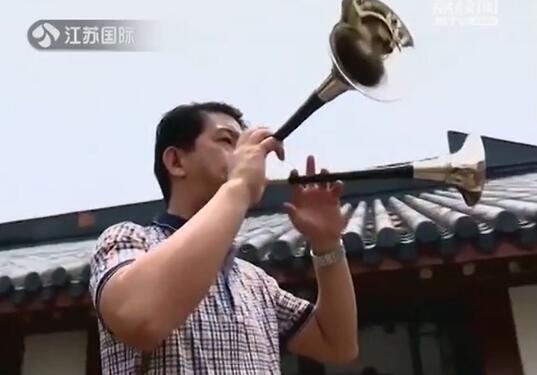46 artists from Jiangsu province have made the list of 1,082 artists with the official responsibility of carrying forward the country's intangible cultural heritage. The list was announced by China's Ministry of Culture and Tourism recently.
The inclusion of the 46 artists has added up to the number of inheritors of intangible cultural heritages in Jiangsu to 178.
Li Shupeng, who was one of the 46 newly-added artists, is the fourth-generation inheritor of Xuzhou Lishi Suona Performance and also the only national-level intangible culture inheritor in Xuzhou. He began to learn playing suona from his father since he was 5 years old. His suona performance of birds paying homage to a phoenix can vividly mimic rooster dawning and hens laying eggs.
In August of last year, Li Shupeng was invited to the United States to hold a suona performance concert to let the world experience China's "most dazzling ethnic style".
The Suzhou style penjing or potted landscape will also have its national-level intangible culture inheritor. Zhu Zhenqing has spent the past three decades to concentrate thousands of wonders of nature in a basin. For example, this pot of national gold medal-winning penjing is crafted out of a piece of dead wood and it took Zhu a decade of effort to cultivate and prune before the current green canopy takes shape.
Qiao Guiqing, the representative inheritor of Hengshun balsamic vinegar brewing, is also included in the list. Qiao has been engaged in vinaigrette brewing for 30 years. He can control the whole process of balsamic vinegar brewing by scrutinize the color change, smell the acidity, and feel the temperature and humidity by hand.
Inheritors of intangible cultural heritages from 12 of the 13 prefecture-level cities in the province have made the national list.
Artists working in acupuncture, traditional Mongolian clothing, pottery, kites, Thangka, fruit pit carving, Dai ethnic brocades and ethnic musical instruments were on the list.
The list went through a vetting process including recommendations by local cultural departments, assessments by experts, public review and deliberation by judges.
Being recognized as an inheritor involves a strict screening process, which includes a preliminary assessment by experts in cultural heritage and a second assessment by a review committee.
A total of 1,372 items including the Spring Festival, Peking Opera, the Legend of Madame White Snake and Shaolin Kungfu have been published in the previous four batches.
The Ministry of Culture and Tourism said it would work with provincial cultural departments to enhance their support for artisans to promote intangible cultural heritage.
(Source: Jiangsu International Channel)






